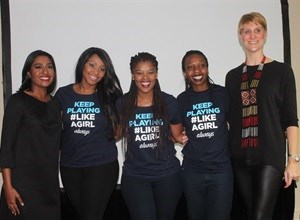
Top stories





Marketing & MediaAds are coming to AI. Does that really have to be such a bad thing?
Ilayaraja Subramanian 19 hours

More news















Always collaborated with Academy Award-nominated documentary filmmaker, Nanette Burstein, to find out how girls feel about playing sports. The video asked girls about their athletic experiences, the challenges and benefits; what helped them stay in the game or what led them to quit. View the video below:
As the world prepares for the Rio 2016 Olympic Games, the brand wants to urge, encourage and inspire girls everywhere to Keep Playing #LikeAGirl. The new campaign has some of South Africa’s influential women in sports rallying behind the campaign to empower girls, including Kass Naidoo, Lebo Motsoeli, Motshidisi Mohono and Sanani Mangisa.
“As someone who has been involved in the sports industry for a long time, I was part of the South African swimming team; I know first-hand some of the challenges of being a female athlete. I know how important sports participation can be in helping girls build the confidence and skills that will serve them throughout life. It is my hope that this video will spark a conversation and inspire girls to keep playing sport. I love and support the #LikeAGirl campaign and I’m thrilled to be partnering with Always to shed light on this important issue,” said sport psychologist and co-founder of Girls Only Project, Kirsten van Heerden.
Sports personality and Always #LikeAGirl ambassador, Motshidisi Mohono said, “Confidence is a girl’s best friend, because when you have it, you feel

like you can conquer the world. I have always wanted to work on something that would inspire young women and girls to be the best that they can be and I think this campaign hits the nail on the head. I too was that girl once dealing with insecurities that came with puberty and watching my confidence in myself and my abilities diminish. At times I still struggle with some of those insecurities.”
“As we bid farewell to the South African Olympics team, we know that the Olympic Games are a time when female sports participation is elevated in the public eye all around the world. We could not think of a better moment to drive awareness of the critical role sports play in building girls’ confidence,” said Tamlyn Allison, Procter & Gamble’s Femcare brand manager for South Africa.
The Always Puberty & Confidence Wave IV study, conducted in December 2015 found:
Many studies have found that ongoing participation in sports is a high contributor to confidence in girls, at any level, and provides valuable skills to help them stay confident to do any and every thing later in life. Some of these studies showed that women aged 18 to 24 are twice as likely to be confident if they play sports regularly, compared to those who do not play at all. However, despite the known benefits, girls still report that they do not feel like they belong in sports. Further, 67% of girls feel that society does not encourage them to play sports.
The millions of girls around the world who are changing #LikeAGirl to mean amazing things are fuelling the movement. The campaign was inspired by the insight that the start of puberty and the first period mark the lowest moment in confidence for girls and how harmful words can add to that drop in confidence. It demonstrated the profound effect the phrase “like a girl” can have on girls’ self-confidence and it inspired a movement, which has started to change public perception.
In 2015, a new Always study revealed that 72% of girls feel society limits them by telling them what they should and should not do or be. In addition, more than half of girls felt that societal limitations would be the same or worse ten years from now, showing a lack of hope for change.
Always could not accept that and launched the Unstoppable #LikeAGirl campaign to empower all girls to show the world that they could do or be anything and everything.
After seeing the #LikeAGirl video, most people (76% of women ages 16 to 24 and 59% of men) said the video changed their perception of the phrase “like a girl.” For more information, go to www.always.com.